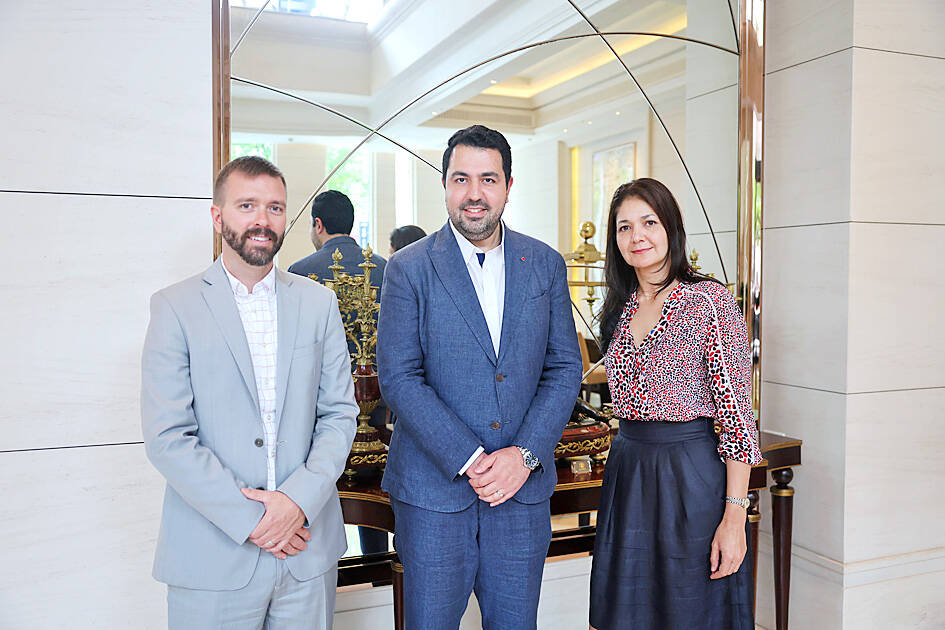A group of visiting Canadian academics yesterday said they are pleased to see Ottawa take steps to develop bilateral ties and gain a deeper understanding of Taiwan.
The steps include starting talks on establishing a bilateral investment pact and appointing a senior diplomat to Taiwan as top envoy, the academics said.
The delegation comprising nine academics arrived in Taiwan on Sunday and is to stay until Saturday. It is headed by Pascale Massot, an assistant professor in the School of Political Studies at the University of Ottawa, who is also a member of the Canadian minister of foreign affairs’ Indo-Pacific Advisory Committee.

Photo: CNA
Vina Nadjibulla, an adjunct professor at the School of Public Policy and Global Affairs at the University of British Columbia, said the purpose of the visit is to “deepen people-to-people relations and to learn about Taiwan.”
“Canada and Taiwan share common values of democracy and respecting human rights. And we face similar challenges in addressing authoritarianism and disinformation. So, it’s very much a learning and exchanging-of-views trip,” she added.
Nadjibulla said the group has visited the Ministry of Foreign Affairs, three major political parties, and think tanks as Taiwan heads toward next year’s presidential election.
She said it is important to treat Taiwan “as an agent, not just a chip in the geopolitical game.”
The visit would give the academics firsthand experience of Taiwan, which is crucial in providing insights, instead of merely “watching it from afar,” she added.
She added that warming relations between Taiwan and Canada are positive, because the two have “complementary economies,” and share similar values and challenges, adding that the prospect of a bilateral foreign investment promotion and protection agreement (FIPA) was “very exciting.”
In February, Minister Without Portfolio John Deng (鄧振中) and Canadian Minister of International Trade, Export Promotion, Small Business and Economic Development Mary Ng (伍鳳儀) in a joint statement said that the two sides had agreed to begin formal negotiations on a FIPA.
The talks began after Ottawa in November last year issued its first Indo-Pacific Strategy, which says the future of the region is of the utmost importance to Canada.
The document mentions Taiwan numerous times, saying that Canada would continue its multifaceted engagement with the nation by deepening cooperation in trade, technology, supply chains, healthcare, democratic governance and tackling disinformation.
It also says that Canada would continue to foster economic and people-to-people exchanges with Taiwan, and support its resilience.
Canadian Global Affairs Institute president David Perry said Canada has some “really pointed language” about Taiwan in its Indo-Pacific Strategy, “in a positive sense.”
Bijan Ahmadi, executive director and founding member of the Institute for Peace and Diplomacy, a Canadian non-partisan think tank, said the FIPA talks and the appointment of Canadian representative to Taiwan Jim Nickel are evidence that Ottawa has been placing more emphasis on Taiwan.

Chinese spouse and influencer Guan Guan’s (關關) residency permit has been revoked for repeatedly posting pro-China videos that threaten national security, the National Immigration Agency confirmed today. Guan Guan has said many controversial statements in her videos posted to Douyin (抖音), including “the red flag will soon be painted all over Taiwan” and “Taiwan is an inseparable part of China,” and expressing hope for expedited reunification. The agency last year received multiple reports alleging that Guan Guan had advocated for armed reunification. After verifying the reports, the agency last month issued a notice requiring her to appear and explain her actions. Guan

GIVE AND TAKE: Blood demand continues to rise each year, while fewer young donors are available due to the nation’s falling birthrate, a doctor said Blood donors can redeem points earned from donations to obtain limited edition Formosan black bear travel mugs, the Kaohsiung Blood Center said yesterday, as it announced a goal of stocking 20,000 units of blood prior to the Lunar New Year. The last month of the lunar year is National Blood Donation Month, when local centers seek to stockpile blood for use during the Lunar New Year holiday. The blood demand in southern Taiwan — including Tainan and Kaohsiung, as well as Chiayi, Pingtung, Penghu and Taitung counties — is about 2,000 units per day, the center said. The donation campaign aims to boost

The Kaohsiung Tourism Bureau audited six hotels in an effort to prevent price gouging ahead of Korean band BTS’ concert tour in the city scheduled for Nov. 19, 21 and 22 this year. The bureau on Friday said that the audits — conducted in response to allegations of unfair pricing posted on social media — found no wrongdoing. These establishments included the local branches of Chateau de Chine, Hotel Nikko, My Humble House, and Grand Hai Lai, it said, adding that the Consumer Protection Commission would have penalized price gougers had the accusations been substantiated. The bureau said the Tourism Development Act

BACK TO WINTER: A strong continental cold air mass would move south on Tuesday next week, bringing colder temperatures to northern and central Taiwan A tropical depression east of the Philippines could soon be upgraded to be the first tropical storm of this year, the Central Weather Administration (CWA) said yesterday, adding that the next cold air mass is forecast to arrive on Monday next week. CWA forecaster Cheng Jie-ren (鄭傑仁) said the first tropical depression of this year is over waters east of the Philippines, about 1,867km southeast of Oluanpi (鵝鑾鼻), and could strengthen into Tropical Storm Nokaen by early today. The system is moving slowly from northwest to north, and is expected to remain east of the Philippines with little chance of affecting Taiwan,